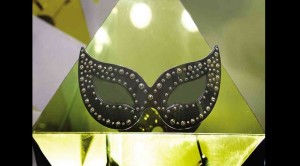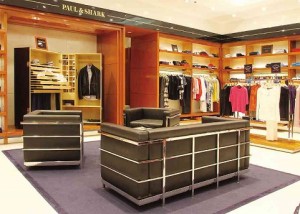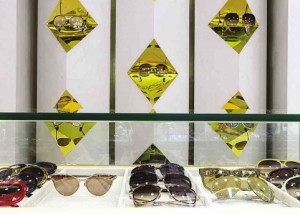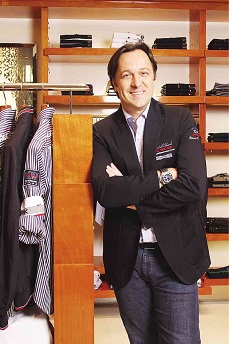The Italian job: Finding a niche in the luxury market

VICE GANDA wears these punk sunglasses designed by Agent Provocateur for Linda Farrow. PHOTO BY NELSON MATAWARAN
When the Linda Furrow luxury eyewear store opens at the City of Dreams, it will present diamond-studded, solid gold sunglasses worth over P1 million. Meanwhile its designer sunglasses made of snakeskin, studs and amethyst, have been selling like hotcakes at P50,000 to P60,000. Then there’s the upscale sportswear brand, Paul & Shark, which has polo shirts that range from P8,000 to P15,000. It’s said to be worth every thread because everything is made in Italy.
Big dreams, adaptability in exploring the market needs, helping customers and enjoying the work have transformed a small company in Cebu into a flourishing retailer and distributor of luxury brands.
Italian entrepreneur Gabriele Boschi (pronounced boskee) has what it takes to start up a business—gumption, tenacity and persuasiveness.
The chief executive officer of Brand Gateway which owns the franchise of six high-end fashion brands, says last year’s gross sales grew dramatically by 48 percent, compared with the average 20 to 25 percent growth in the previous years. By yearend, Boschi is projecting some 40 stores for all its brands. He attributes the dramatic sales to the country’s optimistic economic progress and liberal consumer spending—at least on the high-end market.
Aside from Linda Farrow and Paul & Shark, Brand Gateway’s portfolio includes Rudy Project eyewear and accessories, Piquadro leather goods, Luminox watches, and Orca sportswear. Although the brands advertise, the target market has already been already familiar with them.
“We just had to make the products available to our customers,” says Boschi. “The philosophy of my company is to have a quality product and to stand by it. We just don’t sell a product just because it’s popular. We sell in what we believe in. The products speak for themselves. We’d rather have a steady growth based on the reputation of quality than just have fad. Likewise, customer service is important. The client must be happy with the product.”
Startup
Entrepreneurship is in Boschi’s blood. He came to the Philippines 25 years ago at the age of 11. His father, Giovanni, owns a rattan furniture factory, Giardini Del Sole (Garden in the Sun) and for many years has been the country’s the top exporter. The younger Boschi worked for his father and eventually found another job as general manager for Fil-Veneer in Cebu’s export processing zone.
In a trip to Italy, Boschi met Rodolfo Barbazza, owner of Rudy Project, high-tech sports eyewear. Impressed with the brand, Boschi started distributing the eyewear to optical shops in Cebu. However, Rudy Project, despite its product strengths, was eclipsed by legions of other high-end eyewear brands. An independent brand was facing stiff competition from the giant companies.
Boschi then moved the business to Manila went into retail and eschewed optical shops. With silent partners Santi Araneta and Don Longa, they set up Rudy Project Philippines nine years ago. It started with a kiosk in Glorietta 4 then a store at the Podium. With the popularity of marathons, triathlons and other sport events, Rudy Project brand took off.
“Rudy Project is small for a niche market but not mass market. We did our own shops that built the brand.” Today it has 13 stores, including one in Boracay.

PAUL & SHARK: The store at Shangri-La East Wing follows the design from the company’s design studio. However the furniture and shelves were built by Boschi’s father in Cebu. The stainless steel and leather materials were imported from Italy. The African wood used for the shelves were sourced from London. PHOTO BY NELSON MATAWARAN
Rudy Project Philippines expanded into licensing when it tapped the corporate market which demanded accessories for gifts and giveaways. In keeping with the sporty image, Rudy Project stores also offer Orca, an athletic clothing line from New Zealand.
As Boschi diversified, the company was renamed Brand Gateway.
In his trips to Italy, Barbazza would invite Boschi to go yachting at Iesolo, a commune near Venice. At the Iesolo yacht club, Boschi observed that everyone looked sharp with Paul & Shark clothes. The company’s history dates back to the early 20th century as a knitting mill outside of Milan. The third generation developed it into a sportswear brand.
The most popular items come from the Kipawa line, which was named after the boat on which the royal family sailed. However, there are dress shirts made from the finest Egyptian cotton that fetch P15,000. “People would spend this amount of money when they travel. Now it’s available in the Philippines. They can shop here everyday. The advantage is that if they want sizes, they can be custom fitted,” says Boschi. He adds that he has to order large and extra large sizes, which comprise the bulk of its buyers. The market attracts affluent businessmen who like to keep fit.
Despite the price range-jackets can cost P35,000 and slacks fetch P20,000—people would invest in quality. He says children end up inheriting their parents’ shirts because of the durability.
Still, Boschi needs to raise awareness of the brand. On March 16, Boschi will launch Paul & Shark through a polo game at the Manila Polo Club. In fact, his company is often sponsoring teams or events.
“Honestly, it’s not for sales or to promote the brand. It’s just to be part of their world. We’re giving back a little to make sure their sports can survive. The best marketing is when the client buys the product and is happy. They come back and buy again. If there is problem, we take care of it. We then have customer for life.”
For their eyes only
One of the brands that showed surprising performance is Piquadro, the fifth most recognizable brand in leather goods in Italy. At the SM Aura branch, sales more than doubled after the first month. Boschi attributed the sales to the high quality leather at affordable prices from P8,000 to P35,000.
“Women sometimes carry their handbag and another bag for their laptop which is quite ugly. There are attractive luxury bags that can store everything, including a laptop or a tablet,” he says.
With Linda Farrow eyewear, Boschi partnered with Pascual Optical which can also provide lenses for the high-end prescription glasses. Boschi discovered in a niche in the luxury category. The brand is easy to sell because it partners famous designers such as Oscar dela Renta, Matthew Williamson, Jeremy Scott, Alexander Wang and Philip Lim. It is also attractive to consumers because of the celebrity factor. The brand supplies oversized acetate glasses to Lady Gaga. Beyoncé and Angelina Jolie wear it for everyday.
“The brand doesn’t sponsor. These celebrities have to buy them,” says Boschi.
Vice Ganda, known for his fashion flair, snapped up the metal studded glasses by Agent Provocateur. Isa Calzado got a designer pair. For people who don’t want to look like dorks in prescription glasses, the handmade acetate frame costs P25,000.
“We didn’t expect it to sell. We thought we’d sell four to five pieces but we end up selling 40 pieces a month,” says Boschi.
Jan Andrew Naval, brand executive, says the reason for the sales is that when women get together, they wouldn’t want to get caught wearing the same styles. The pricey sunglasses made of gold and python move faster.
High value
Next to eyewear, venturing into watches was a logical step. Brand Gateway has Itanano, a mid-range Italian brand that uses nano technology is distributed in watch stores and Luminox, the American brand which has some freestanding stores. The watches can cost as much as P150,000. However, when the store opened at the Mall of Asia, it raked in P300,000 in sales on the first week.
Because Luminox is worn by the US Navy SEALS and the FBI agents, even the NBI agents have their version. Boschi underscored that the NBI agents paid for their watches, and not the government.
Boschi says each brand has developed its own niche and that they don’t directly compete with the giants. His advantage is choosing successful brands, most of which come from Italy.
Brand Gateway’s success is credited to each of its customers who has become a resource for funding and spreading the word. “Filipinos appreciate quality. They are willing to spend the money. Our market likes being like sporty and is health conscious. When we bring in a brand, we focus on the client whom we understand. We don’t bring products for kids and teenagers, whom we don’t know about. We start market from ages 25 to 60. We know it well and what they like to buy. We are growing that core group of clientele of 20,000. They give the trust, you keep the trust through great customer service and care your business is done. We also get the aspirational market-people who pay with their credit card with 12 months to pay,” he says.
On the risks in his business, Boschi replies, “The tendency is to open more stores as the country grows. The only risk as a company is to believe too much in a country, then a crisis suddenly comes about and you’ve been over expanding.”
He doesn’t make decisions based on short-term profits. “We make solid budget plans for the year and make our projections.”
All told, Boschi’s precept is about being uncompromising in quality. “If I buy the cheap stuff, my reputation would be ruined. Why buy cheap shoes that you wear for three times, your feet hurt and you throw them away. You can buy less but for value.”


